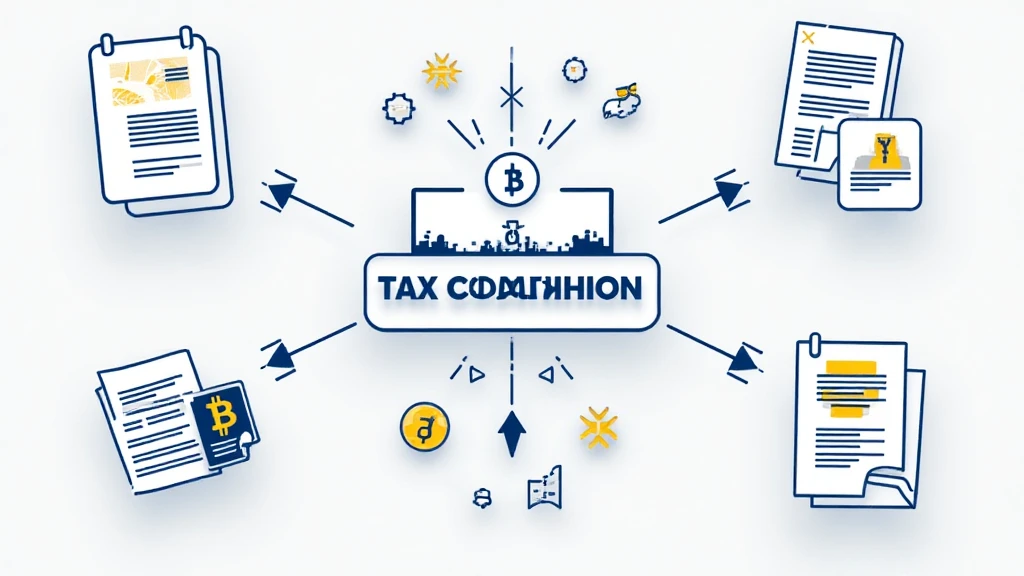
Navigating Bitcoin Tax Compliance Frameworks
In 2024, with **$4.1B** lost to DeFi hacks and rising scrutiny from regulators, the cryptocurrency landscape is evolving. As Bitcoin users grow globally, including a **40% growth** in Vietnam’s crypto market, understanding tax compliance is more critical than ever.
This article aims to provide a comprehensive guide on Bitcoin tax compliance frameworks, tailored for both seasoned investors and newcomers. Here’s why this matters: staying compliant not only avoids hefty penalties but also establishes your credibility as a responsible investor.
Understanding the Basics of Bitcoin Tax Compliance
Many people ask: How is Bitcoin taxed? To answer this, let’s simplify it:

- Bitcoin is treated as property in most jurisdictions, meaning capital gains taxes apply.
- Losses can be deducted, which is essential for minimizing tax liabilities.
- In countries like Vietnam, regulations are rapidly evolving, requiring local knowledge of compliance frameworks.
According to the IRS guidelines, every transaction involving Bitcoin can trigger a taxable event. The complexity here arises with the need to track transactions accurately.
Cryptocurrency Regulations Across the Globe
Governments are scrambling to catch up with this burgeoning technology, presenting a patchwork of regulations. Let’s break down some international frameworks:
- United States: The IRS mandates reporting of all crypto transactions, using a specific form (8949).
- European Union: The EU is working on a new regulatory framework (MiCA) to harmonize crypto rules across member states.
- Vietnam: The government is developing policies to regulate the crypto space, pushing for user education to promote compliance.
Each of these frameworks has its unique requirements and implications for tax compliance. It’s crucial to stay informed and consult local regulations.
The Role of Record Keeping in Compliance
Accurate record-keeping plays a crucial role in ensuring compliance. Here’s how:
- Document all transactions meticulously, including dates, amounts, and involved parties.
- Utilize software that automatically tracks transactions, helping to mitigate the risks of human error.
- Keeping a log of trading paired with comprehensive summaries can be beneficial during audits.
Consider using tools like **CoinTracking** to simplify this process. It helps users adhere to regulations effortlessly.
Challenges in Cryptocurrency Tax Compliance
While many are eager to invest, several challenges persist:
- Complexity: Rapidly evolving regulations can lead to confusion.
- International Transactions: Exchange rates must be calculated according to the day of the transaction.
- Lack of Entity Guidance: The decentralized nature of cryptocurrencies complicates issues of accountability and traceability.
Like misplacing paper documents, missing transaction entries can have significant repercussions for tax compliance. Each missed transaction could mean an audit risk.
Future Trends in Bitcoin Tax Compliance Frameworks
Looking ahead, several trends indicate the direction regulations are headed:
- Increased Automation: More jurisdictions will likely adopt automated systems for tax assessment.
- Global Standards: International collaboration on cryptocurrency tax standards is very likely.
- User Education: Programs aimed at educating users about compliance will increase.
According to Chainalysis, **by 2025**, countries will increasingly rely on AI to analyze blockchain data for tracing transactions.
Conclusion: Embracing Compliance for Future Growth
In conclusion, the best way to navigate Bitcoin tax compliance frameworks is through understanding, proper record-keeping, and staying informed about evolving regulations. By doing so, investors can protect their assets and build a more credible investment profile.
As the Bitcoin market expands in Vietnam and beyond, remembering the importance of compliance and tax obligations will set investors apart. Cryptocurrency isn’t just about gains; it’s also about respectability. Always consult your jurisdiction’s regulations and consider professional assistance for your crypto tax needs.
To conclude, remember that the world of cryptocurrency is dynamic and ever-changing. Staying informed and compliant positions you for success in this exciting field. Don’t forget to visit btcmajor for more insights.







